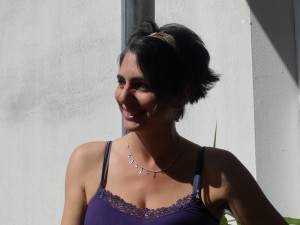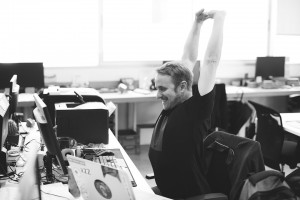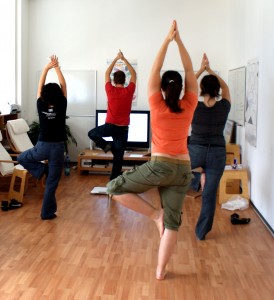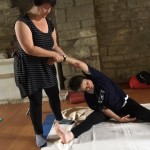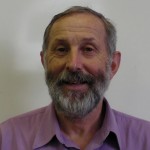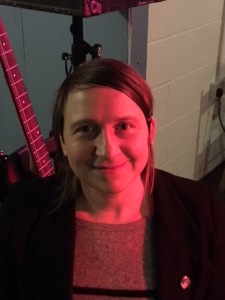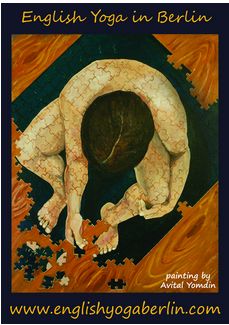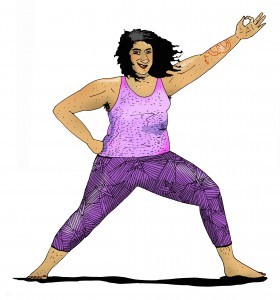
Yama and Niyamas: the non-physical benefits of Yoga
In Patanjali´s classical texts about yoga, eight parts of a yogic practice are outlined. These parts can also be referred to as “limbs”. The most widely known limb of yoga is Asana practice– the practice of physical postures. In our English Berlin Yoga Classes, we understand the value of going beyond the physical. This workshop, therefore focuses mostly on two specific limbs of Patanjali´s eight-fold path: Yamas and Niyamas.
Yamas and Niyamas are the first two steps of yoga that Patanjali discusses in the Yoga Sutra. They are ethical, behavioral and spiritual guidelines for living. There is a lot of room for interpretation with the Yamas and Niyamas–because of basic translation issues (some concepts are very tricky to twist into English!). These guidelines are designed for yogis to personally interrogate, observe and experience in the context of their own lives. They are given to students of yoga to contemplate and incorporate into their everyday lives.
When: Sunday 27th of January, 2019 14:00
Where: At The Yoga Hub Berlin, Greifswalder Str. 8, 10405 Berlin, Germany
Who is this workshop for:
Anyone who would like to be introduced to the dimension of yoga that is both beyond and essential to the physical practice. This workshop is also good (but not only) for yoga teachers wishing to refresh or deepen their knowledge.
Format of workshop:
This workshop is given in the form of a talk with ten mini self-explorative guided meditations to make the material relevant to you and your every day life.
Please note:
- Most of the talk will focus on:
- Patanjali and the goal of yoga
- the Yamas and Niyamas (ethics and moral observances)
- Pratyahara (the practice of dettachment).
- The talk will focus very briefly on:
- Asanas (yogic postures)
- Pranayama (breathing techniques)
- As these are explained in the regular Hatha Yoga classes
- The talk will briefly introduce the goals of:
- Dharana (concentration)
- Dhyana (meditation)
- Samadhi (liberation)
- as these subjects are too big for a 2.5 hr workshop.
About the teacher:
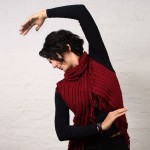 Background info: Beginning her yoga journey in 1999, Pinelopi completed a 600 hour Hatha Yoga Teacher and Vedantic Philosophy Training course over a period of two years in Valencia, Spain. This training is recognized by the Berufverband de Yogalehrenden in Deutschland (BDY), World Movement of Yoga and Ayurveda and the European Yoga Federation. For the last decade, she has worked as a full-time yoga teacher in Spain and in 2010 she founded English Yoga Berlin. Currently she is deepening her knowledge through Leslie Kaminoff’s Yoga Anatomy Course and David Moore’s “Injury-free yoga” applying the Alexander Technique postural alignment to all yoga poses.
Background info: Beginning her yoga journey in 1999, Pinelopi completed a 600 hour Hatha Yoga Teacher and Vedantic Philosophy Training course over a period of two years in Valencia, Spain. This training is recognized by the Berufverband de Yogalehrenden in Deutschland (BDY), World Movement of Yoga and Ayurveda and the European Yoga Federation. For the last decade, she has worked as a full-time yoga teacher in Spain and in 2010 she founded English Yoga Berlin. Currently she is deepening her knowledge through Leslie Kaminoff’s Yoga Anatomy Course and David Moore’s “Injury-free yoga” applying the Alexander Technique postural alignment to all yoga poses.
Price: 35 Euro
Early registration discount:10 € discount if you register before January 15, 2019. The workshop is refundable unless cancellation occurs later than January 13th, after which 50% refund. Space is limited so register early before the spots fill up!
To book a place please contact:
pinelopi (at) englishyogaberlin (dot) com
Pinelopi specializes in Hatha Yoga. Her yoga Kreuzberg Berlin classes are open for and welcoming to beginners. She offers Berlin business yoga, private yoga classes for people struggling with chronic pain, yoga courses and workshops.





